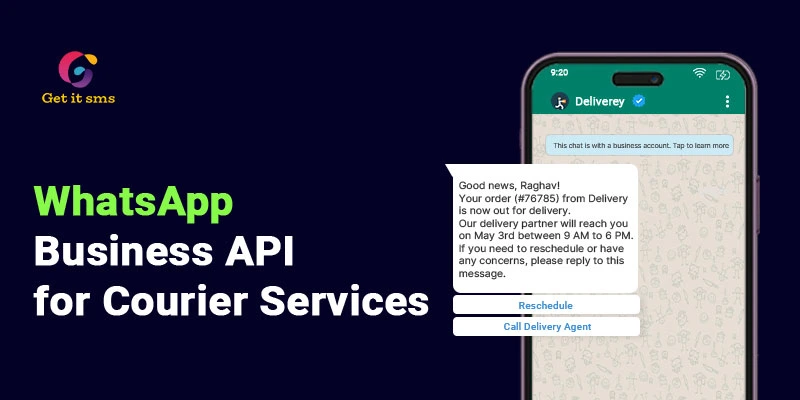Want To Send Bulk SMS?
If yes, then test our service for FREE.
Get a 1 Month Free Trial of WhatsApp Business API
You are looking for RCS Messaging VS SMS: What is the Difference and Which One Is Better? When it comes to differentiating between RCS and SMS, there is no easy answer to that question. The two messaging standards possess their pros and cons, and care should be taken to choose the best for your business communication.
When the average person imagines a text message, they probably envision SMS (Short Message Service), a set of protocols that have existed within cellular networks for decades. In more recent times, however, a new messaging format has come along, one that is RCS (Rich Communication Service).
In this article, we will compare the two criteria of both SMS and RCS. This will assist in picking the best service for your enterprise. Let’s go a step further and discover which one is superior to the other.
What is SMS, and How Does it Work?
SMS is the most popular and broadest-used texting form. It is the default message type globally. Due to the fact that it is ubiquitous, you can use SMS to deliver a message to nearly any user without them having to be logged in to a WiFi or data connection. Rather, SMS messages are delivered straight through the cellular network, like voice calls. It also acts as a backup option if messages over other mediums do not get through.
SMS is based on the Global System for Mobile Communications protocol that specifies how messages are delivered and received over the carrier network.
For intercarrier messaging, the Short Message Peer-to-Peer protocol facilitates delivery between carriers. Cellular network use, as opposed to internet communication, is the reason messages sent and received via SMS do not factor into mobile carrier data plans.
Short messages are not new; over 23 billion SMS texts are exchanged daily between individuals. SMS is so ubiquitous that, in the long run, it may not reflect more dramatic growth. Yet, due to its penetration, it’ll still play a significant role in a multi-faceted communications plan.
What is RCS Messaging, and How Does It Work?
The RCS messaging protocol is a new service that improves the messaging experience for RCS-compatible devices, producing an improved experience and behaving more like an OTT app like WhatsApp or iMessage than SMS.
However, the catch with RCS is that users are able to utilize it directly within their phone’s native messaging app. The users can experience the newer capabilities of the RCS Messaging service. These capabilities are– real-time, branded messages, high-resolution video, read receipts, group chat, typing indicators, end-to-end encryption, and more – without needing to install a new third-party app.
These capabilities make rich communications so robust, perhaps accounting for the greater engagement of RCS users compared to SMS users.
RCS is an open standard, so that any device can add the feature-rich protocol for free and without fear of inoperability. Devices that send and receive RCS messages need to be connected to Wi-Fi or LTE/5G IP data network services. Data received and sent is billed against any mobile carrier data plans in effect.
RCS Messaging VS SMS: Key Differences
RCS Messaging and SMS differ a lot in network dependency, functionality, message delivery and confirmation, integrations, and security. Here, in this section, we will understand the basic difference between RCS and SMS:
1. Network Dependency
The key difference between RCS and SMS is that SMS transmits via the cellular network, whereas RCS content needs data connectivity prior to transmission. SMS-supported messages are still able to be sent and received in certain situations where there is no data connectivity available. With the increase of LTE and 5G, internet connectivity is abundant across most regions, allowing for an enhanced, feature-filled service.
2. Functionality
When it comes to functionality, SMS has a rigid 160-character limit and no multimedia support for features within messages. RCS offers a variety of multimedia within messages, including video, GIFs, and audio. RCS has no character limit, and one to many-can be sent from one device to many devices to enable group chat features. Furthermore, files are enabled to be sent over the service directly.
3. Message Delivery and Read Receipts
SMS service has very limited message delivery confirmation capabilities that mainly rely on the carrier configuration. SMS only informs sending users in most scenarios that messages have been delivered successfully. RCS, however, employs more sophisticated messaging features that accurately notify senders that messages were delivered and whether or not they’ve been read.
4. Integrations
Because SMS uses the carrier’s cellular network for the transport of messages, integrations with other applications and services are limited. However, since RCS uses IP like most other mobile applications, it has more opportunities to integrate with other messaging services, chatbots, and business tools, including CRM systems, sales and marketing automation systems, and ticketing services.
5. Security
SMS messages provide no encryption, leaving the possibility open for message interception, tampering, and a general lack of confidentiality. RCS includes security features, including Transport Layer Security for encryption during message transport and Secure Real-time Transport Protocol for voice/video transport. Some third-party apps using RCS, however, might employ extra or alternative data encryption techniques to provide end-to-end encryption.
Which one is better?
Referring to the points mentioned above, SMS will surely be evergreen for businesses of any size. On the other hand, RCS is picking up pace in the business and telecom industries. RCS is thought to be a more convenient and feature-laden communications platform than SMS and even other OTT alternatives such as WhatsApp, Facebook Messenger, and Telegram.
For such third-party services, both the sender and receiver need to be logged in in order to access the same app. RCS provides equivalent security capabilities as third-party services, including message encryption and checking messages prior to delivery. SMS does not provide these security features.
Frequently Asked Questions
Q.1 What is the main difference between RCS and SMS?
A. RCS is a more evolved messaging service that supports multimedia sharing, read receipts, and typing indicators. Meanwhile, SMS is an elementary text-messaging service with a 160-character limit and no multimedia support.
Q.2 Which is preferable for businesses, RCS or SMS?
A. The optimum choice depends on your target audience and business objectives. RCS is best for those who want to get increased engagement, personalization, and interactive content, whereas SMS can be used for simple notifications and transactional ones.
Q.3 Can I use RCS for international messaging?
A. Yes, RCS is utilized for global messaging, but compatibility depends on the nations in play.
Q.4 Does RCS cost money?
A. RCS itself is typically free to receive. The only possible expense for any individual user would be the cost of the data allowance that it consumes.
Q.5 Is RCS more secure than SMS?
A. RCS provides more security features, including end-to-end encryption (for one-to-one messages on supported apps such as Google Messages). SMS does not have encryption and is easier to intercept.
Conclusion
In conclusion, as the digital world keeps evolving, both RCS Messaging and SMS will be key in determining how we connect, communicate, and interact with each other.
Knowing the capabilities and limitations is crucial in making informed decisions that support your communication objectives. Whether you use the simplicity of SMS or the richness of RCS, both technologies have made their mark and helped drive the dynamic and interconnected nature of messaging.
Therefore, whichever you decide, make it meet your business requirements and allow you to stay competitive in the market
Recent Posts







 within 24
Hrs +
60
Days Free API Panel
within 24
Hrs +
60
Days Free API Panel



